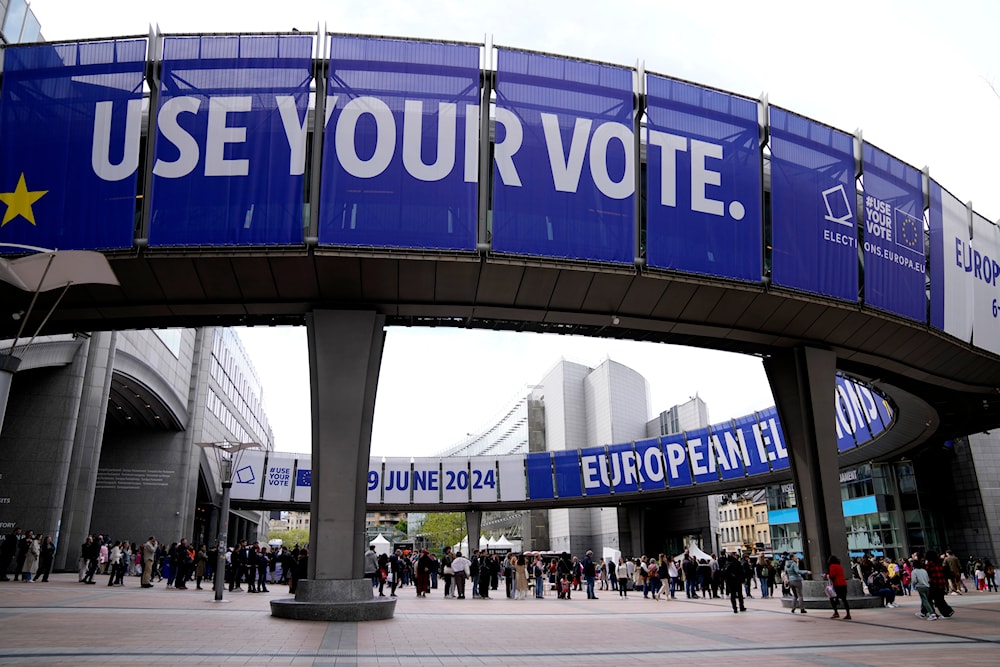EU elections open in Netherlands, far-right expected to win
The results of the votes could very much affect Brussels' approach to climate change, ties with the US and China, aid to Ukraine, EU development and memberships, and the integration of AI innovations.
-

People wait in line to visit the European Parliament during Europe Day celebrations in Brussels on May 4, 2024. (AP)
The four-day election marathon across the 27 countries of the European Union has kicked off in The Netherlands, with France, Germany, and others voting on Sunday, as the bloc's 370 million voters are voting at a time of deep geopolitical uncertainty.
The Netherlands is just one of the bulk of nations where nationalist and far-right parties are expected to prevail in the results, while the Freedom Party (PVV) of Geert Wilders, who won the national elections last November, is also expected to take another win.
The results of the polling could very much affect Brussels' approach to climate change, ties with the US and China, aid to Ukraine, EU development and memberships, and the integration of AI innovations.
Meanwhile, the votes count as a challenge for EU Commission chief Ursula von der Leyen, who is trying to run for a second term. Even if she does get votes, she would still need support from parliament.
On June 6-9, Europeans will head to polls to vote for the new #EUParliament, one of the most vital legislative bodies of the #EuropeanUnion.
— Al Mayadeen English (@MayadeenEnglish) June 4, 2024
The vote, the first since #Brexit, will have its effects of course on the war in #Ukraine and other major issues for #Europe. pic.twitter.com/T2t8Nmk8ry
Far-right expected to win
Sebastien Maillard, of France's Jacques Delors Institute said, "These are troubled times, and there's a need to move fast," noting, "What's at stake is Europe's ability to embody democracy, to find compromises, to stay sufficiently united... faced with (Russia's Vladimir) Putin, faced with China, faced with the future American president."
In other EU nations, France is anticipated to see Marine Le Pen's National Rally party take the top. The same goes for Italian Premier Giorgia Meloni's Brothers of Italy and Hungarian Prime Minister Viktor Orban's far-right Fidesz party.
The extreme-right AfD in Germany, however, is expected to come in second after the opposition conservatives. In Austria, the far-right Freedom Party seems to be on track for a win.
Read more: Palestinian cause central to political landscape in Europe
Polling data gathered by Politico shows that von der Leyen's conservative European People's Party (EPP) may nail the most parliament seats at 172, which is less than a quarter of the chamber - insinuating that a coalition is required to pass legislation.
According to political analysts, the EPP's alliance with the leftist Socialists and Democrats – which are predicted to garner 143 seats – and the centrist Renew Group predicted to take 75, will continue.
EU future in danger
Last month, Spain's environment minister, Teresa Ribera, warned that the European Union's future is in danger due to individuals who exploit social tensions for immediate political advantage. She emphasized that the European project faces the risk of "implosion" ahead of the upcoming European parliamentary elections.
Meanwhile, a shift in politics in Europe has created a scare for mainstream parties as more pro-Palestine supporters are gearing more toward left-leaning parties with a more vocal pro-Palestine stance.
Blandine Chelini-Pont, a historian at Aix-Marseille University, said that far-left La France Insoumise (LFI) is seeking to ban arms and impose sanctions on "Israel" while recognizing a Palestinian state, as well as refrain from calling the Palestinian Resistance Hamas a "terrorist group", thus attracting Muslim and radical-left voters.
LFI lawmaker Sebastien Delogu told Reuters, "Some will say we are surfing on an electorate but who are we speaking about? These are citizens of this country who do not have a racist vision of society."

 4 Min Read
4 Min Read








